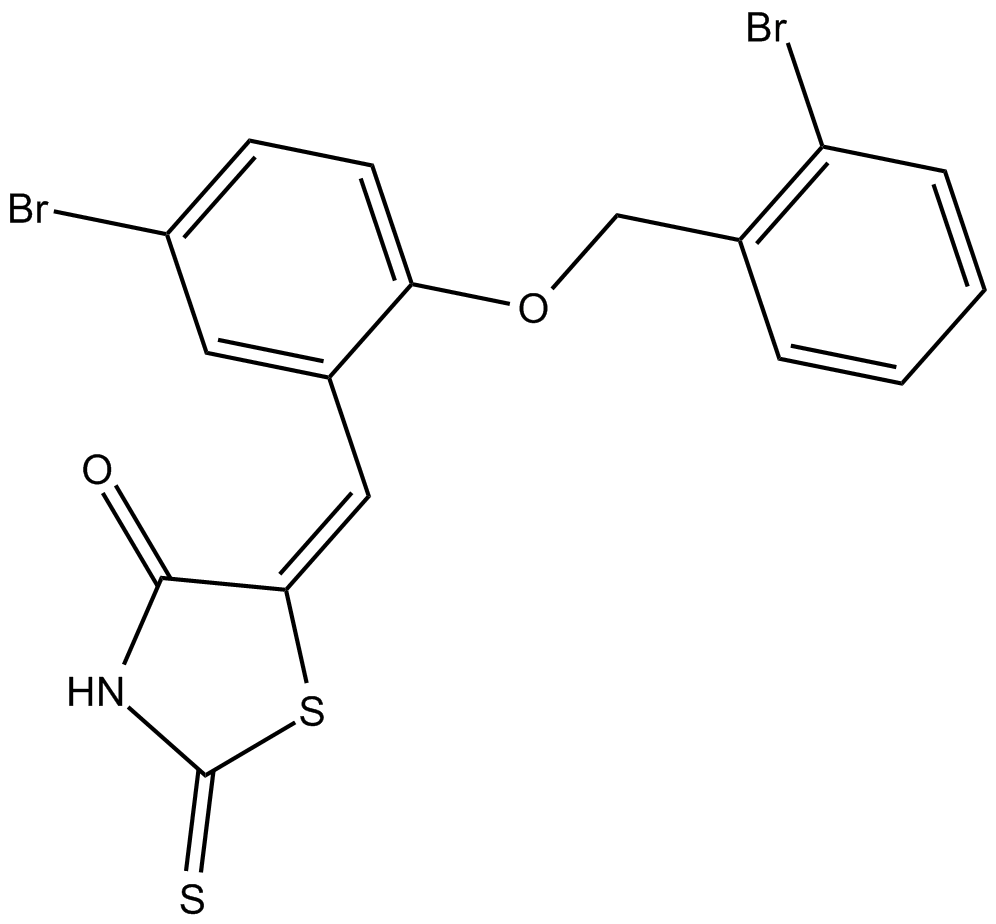PRL-3 Inhibitor (Synonyms: BR-1,P0108,Phosphatase of Regenerating Liver 3 Inhibitor,PTP4A3 Inhibitor) |
| Catalog No.GC16900 |
PRL-3 Inhibitor is a potent PRL-3 inhibitor with an IC50 of 0.9 μM. PRL-3 Inhibitor shows a reduced invasion in cell-based assay.
Products are for research use only. Not for human use. We do not sell to patients.

Cas No.: 893449-38-2
Sample solution is provided at 25 µL, 10mM.
Phosphatase of regenerating liver 3 (PRL-3; also known as PTP4A3) plays critical roles in cell proliferation, motility, and invasion, and thus contributes to cancer metastasis. PRL-3 inhibitor is a cell-permeable benzylidene rhodamine that inhibits PRL-3 (IC50 = 900 nM for human PRL-3 in vitro), with minimal activity against other phosphatases.[1],[2] It reduces the invasion of mouse melanoma B16F10 cells in a cell-based assay.[1] PRL-3 inhibitor has been used to elucidate the actions of this enzyme, demonstrating that it dephosphorylates Tyr783 on integrin β1 and modulates VEGF-mediated endothelial cell migration.[3],[4] It dose-dependently inhibits the growth and triggers apoptosis in cancer cell lines.[5],[6]
Reference:
[1]. Ahn, J.H., Kim, S.J., Park, W.S., et al. Synthesis and biological evaluation of rhodanine derivatives as PRL-3 inhibitors. Bioorganic & Medicinal Chemistry Letters 16(11), 2996-2999 (2006).
[2]. Min, G., Lee, S.K., Kim, H.N., et al. Rhodanine-based PRL-3 inhibitors blocked the migration and invasion of metastatic cancer cells. Bioorganic & Medicinal Chemistry Letters 23(13), 3769-3774 (2013).
[3]. Tian, W., Qu, L., Meng, L., et al. Phosphatase of regenerating liver-3 directly interacts with integrin β1 and regulates its phosphorylation at tyrosine 783. BMC Biochemistry 13:22, (2012).
[4]. Zimmerman, M.W., McQueeney, K.E., Isenberg, J.S., et al. Protein-tyrosine phosphatase 4A3 (PTP4A3) promotes vascular endothelial growth factor signaling and enables endothelial cell motility. The Journal of Biological Chemisty 289(9), 5904-5913 (2014).
[5]. Ooki, A., Yamashita, K., Kikuchi, S., et al. Therapeutic potential of PRL-3 targeting and clinical significance of PRL-3 genomic amplification in gastric cancer. BMC Cancer 11:122, (2011).
[6]. Zhou, J., Bi, C., Chng, W.J., et al. PRL-3, a metastasis associated tyrosine phosphatase, is involved in FLT3-ITD signaling and implicated in anti-AML therapy. PLoS One 6(5), (2011).
| Cas No. | 893449-38-2 | SDF | |
| Synonyms | BR-1,P0108,Phosphatase of Regenerating Liver 3 Inhibitor,PTP4A3 Inhibitor | ||
| Chemical Name | 5-[[5-bromo-2-[(2-bromophenyl)methoxy]phenyl]methylene]-2-thioxo-4-thiazolidinone | ||
| Canonical SMILES | BrC1=CC=C(OCC2=C(Br)C=CC=C2)C(/C=C3C(NC(S\3)=S)=O)=C1 | ||
| Formula | C17H11Br2NO2S2 | M.Wt | 485.2 |
| Solubility | ≤16mg/ml in DMSO;16mg/ml in dimethyl formamide | Storage | 4°C, protect from light |
| General tips | Please select the appropriate solvent to prepare the stock solution according to the
solubility of the product in different solvents; once the solution is prepared, please store it in
separate packages to avoid product failure caused by repeated freezing and thawing.Storage method
and period of the stock solution: When stored at -80°C, please use it within 6 months; when stored
at -20°C, please use it within 1 month. To increase solubility, heat the tube to 37°C and then oscillate in an ultrasonic bath for some time. |
||
| Shipping Condition | Evaluation sample solution: shipped with blue ice. All other sizes available: with RT, or with Blue Ice upon request. | ||
| Prepare stock solution | |||

|
1 mg | 5 mg | 10 mg |
| 1 mM | 2.061 mL | 10.305 mL | 20.6101 mL |
| 5 mM | 0.4122 mL | 2.061 mL | 4.122 mL |
| 10 mM | 0.2061 mL | 1.0305 mL | 2.061 mL |
Step 1: Enter information below (Recommended: An additional animal making an allowance for loss during the experiment)
 g
g
 μL
μL

Step 2: Enter the in vivo formulation (This is only the calculator, not formulation. Please contact us first if there is no in vivo formulation at the solubility Section.)
Calculation results:
Working concentration: mg/ml;
Method for preparing DMSO master liquid: mg drug pre-dissolved in μL DMSO ( Master liquid concentration mg/mL, Please contact us first if the concentration exceeds the DMSO solubility of the batch of drug. )
Method for preparing in vivo formulation: Take μL DMSO master liquid, next addμL PEG300, mix and clarify, next addμL Tween 80, mix and clarify, next add μL ddH2O, mix and clarify.
Method for preparing in vivo formulation: Take μL DMSO master liquid, next add μL Corn oil, mix and clarify.
Note: 1. Please make sure the liquid is clear before adding the next solvent.
2. Be sure to add the solvent(s) in order. You must ensure that the solution obtained, in the previous addition, is a clear solution before proceeding to add the next solvent. Physical methods such as vortex, ultrasound or hot water bath can be used to aid dissolving.
3. All of the above co-solvents are available for purchase on the GlpBio website.
Quality Control & SDS
- View current batch:
- Purity: >98.50%
- COA (Certificate Of Analysis)
- SDS (Safety Data Sheet)
- Datasheet
Average Rating: 5 (Based on Reviews and 35 reference(s) in Google Scholar.)
GLPBIO products are for RESEARCH USE ONLY. Please make sure your review or question is research based.
Required fields are marked with *



















